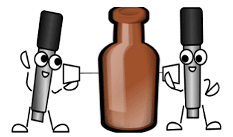Here are four tips on how to improve long term memory. Read on to find out.
As a researcher, field encounters become more meaningful when you gather and recall as much detail as you can. If you do not have a system or technique to do it, it will be difficult. Here are five tips on how to improve long term memory that work for me and will undoubtedly work for you.
Good researchers need a sharp memory; if not, then they will lose valuable information from field encounters. The ability to recall things is not a matter of genes alone. We can develop it with practice and through the use of creative means.
If you have trouble recalling things, then the following memory improvement tips will help you remember those things observed in the field.
Five Tips on How to Improve Long Term Memory
1. Bring your notes and pencil/pen with you.
Notes are indispensable tools to help you recall things. Jotting a few words or phrases in a small notebook will remind you of important statistics such as the number of people who benefited from a project, the number of animals that your interviewee spotted, or the frequency of sightings.
When your automatic audio or video recorder fails, you always have your notes to write on.
2. Always tote the indispensable camera.
For the modern researcher, the camera tells a thousand words. You can describe the study site by just a quick shot of the landscape. Or document a new species which cannot be easily trapped. Setting it in video mode will help you capture people’s conversations and reactions useful, making those available during post-field work analysis. Just make sure you have the memory card inserted inside the camera and the battery is full.
If your camera is not weatherproof or waterproof, bringing along thick, transparent plastic bags to wrap your camera in when unexpected rains come. You will need a rubber band to seal it dry.
3. Always bring a young assistant with you.
Why do you need a young assistant with you? That is, if you are in your senior years, as most specialist researchers are.
Well, the reason is simple. Younger people recall things better than aging researchers who spent most of their time studying and narrowing their frame of mind because of specialization.
If you are a professor, choose a student who performs well in class. He or she may later be an indispensable part of your research projects. Research assistants may stick around to get some more experience and help your research activity become more sustainable. It ensures continuity of the project and will redound to the benefit of the target clientele.
4. Consciously mark things with objects and arrange them in pairs
This tip is a bit tricky and will require attention at the outset. With practice, you will have an amazing long term memory.
It is easy to recall things when you associate them with something. For example, you can represent a series of numbers with the following objects:
1 – a bottle, 2 – a twin, 3 – a tree, 4 – a paper clip, 5 – a hand, 6 – a man with six-pack abs, 7 – a sickle, 8 – a twisted tire, 9 – a cat, and 0 – an egg.
How do you use these numbers to represent a series of numbers, say, a telephone number? Easy. If you want to recall 432-7812, associate this number in pairs of objects representing the numbers in the previous paragraph.

This number converts into the following symbol combinations: a paper clipped on a tree, tree hugged by a twin, one twin holding a sickle, sickle cutting a twisted tire, tire containing a bottle, and a bottle with two small twins inside.
Now, imagine those objects and their relationships in your mind. Whether you recall them forwards or backwards, it is easy to get back to the numbers. Else, you lose an extension of your memory.
5. Associate events that you want to recall with a traumatic incident.
I can easily recall traumatic incidents in my life, no matter how hard I try to forget.
Anyway, you can make use of this memory recall and use it to recall something else. Put it to good use.
Although recalling that unpleasant experience in your life can make you feel bad, it can help you recall important things. You also allay that horrible, nasty, obnoxious or bad experience of yours.
Try these tips on how to improve long term memory and see a difference in your research output.
© 2013 September 19 P. A. Regoniel | Updated 17 January 2023


